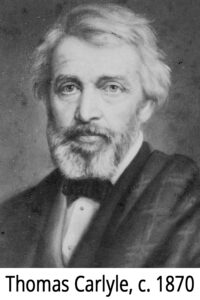Scottish essayist Thomas Carlyle was born this week in 1795. Don’t know who he is? I didn’t either. I had to look him up, despite him being credited as the orator of one of my favorite quotes: “The greatest of all faults is to be conscious of none.”
 Carlyle was a controversial writer, political historian, and philosopher.
Carlyle was a controversial writer, political historian, and philosopher.
Unless you’re a literature major familiar with Victorian-era scholarly works or a mathematician (Carlyle invented the Carlyle Circle, the circle in a coordinate plane of the quadratic equation), you’re not likely to know him.
But frankly, who he was is of little consequence to the art of being a good teammate. His greatest of faults quote, however, is of tremendous relevance to it. You can’t be a good teammate without practicing self-awareness.
When it comes to identifying faults, a lack of self-awareness can destroy a team. Annoying behaviors that you may be unaware of, quick to write off as “normal,” or view as a benign quirk can be a team killer because of how they affect those around you.
Research shows that people who self-reflect and have high self-awareness tend to have a more positive self-image and a deeper understanding of others, which leads to greater empathy—a crucial component of being a good teammate.
Whether your lack of awareness is the product of arrogance or ignorance doesn’t really matter, as both are equally disruptive to teams. Here are four ways you can become more self-aware:
1. Commit to being curious. What do you do that bothers others? What triggers adversarial reactions from those with whom you interact. Start documenting your discoveries.
Benjamin Franklin was famously known for keeping a “balance sheet” of his personal trait assets and liabilities. He tracked his behaviors so he could learn from others, improve his relationships, and grow his influence.
2. Seek formal evaluation. Take a personality assessment like the Myers–Briggs Type Indicator or Predictive Index Test.
Although there are no right or wrong answers on these types of personality evaluations, they compel you to think about your traits and characteristics. Their data can prompt you to become more self-aware of how you operate.
(*By the way…Did you know you can take a FREE good teammate assessment at www.coachloya.com/quiz/? This is a great activity for teams to do together!)
3. Solicit informal assessment. Instead of looking in the mirror, look into the eyes of those closest to you and ask them to give you honest feedback.
Tell them you’re trying to become a better version of yourself and that you want their help. Let them know it’s safe for them to be candid. And then listen to what they say without being instinctively dismissive or defensive.
4, Observe others. Watching others interact from a third-party perspective can be insightful. “People watching” hones your self-assessment skills if you make a point to reflect on whether you do the same things in the same situations.
Don’t rely solely on real, in-person observations. Watching fictional characters in movies or on television can yield equally beneficial outcomes.
Improving your awareness can improve the quality of your relationships, increase your teams’ productivity, and reduce your teams’ drama. Good teammates consider improving awareness to be an investment in themselves and their team.
Last week, the investment world lost a titan with the passing of Charlie Munger. Don’t recognize the name? I didn’t either. But I should have.
Munger was an American businessman, investor, philanthropist, and Warren Buffett’s right-hand man at Berkshire-Hathaway. He would have turned 100 years old on January 1.
Munger was known for espousing many “good teammate” attributes. The quality of the life he led—and the length of it–afforded him a unique perspective.
During a 2017 Berkshire-Hathaway Annual Meeting, Munger said: “I think that a life properly lived is just learn, learn, learn all the time.”
From a good teammate perspective, I like that quote too—especially if the topic being learned is yourself.
As always…Good teammates care. Good teammates share. Good teammates listen. Go be a good teammate.



